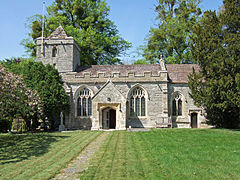Alford, Somerset
| Alford | |
|---|---|
 All Saints Church, Alford |
|
| Alford shown within Somerset | |
| Population | 63 (2011) |
| OS grid reference | ST6032 |
| District | |
| Shire county | |
| Region | |
| Country | England |
| Sovereign state | United Kingdom |
| Post town | Castle Cary |
| Postcode district | BA7 |
| Police | Avon and Somerset |
| Fire | Devon and Somerset |
| Ambulance | South Western |
| EU Parliament | South West England |
| UK Parliament | |
Alford is a village and parish on the River Alham, in Somerset, England, situated 8 miles (12.9 km) south of Shepton Mallet and two miles west of Castle Cary in the South Somerset district. The village has a population of 63.
The parish was part of the hundred of Catsash.
William Rosewell purchased the manor from Sir James FitzJames c. 1563 and it was inherited by subsequent generations: William Rosewell of Forde Abbey (1563–1593); and Sir Henry Rosewell (1593–1656). In 1634 Henry and his wife Mary (Drake) conveyed the manor to Simon Court, who before 1639 sold it to Sir Robert Gorges of Redlynch.
Alford House was built in the late 18th century, but remodelled by F. C. Penrose in 1877.
The parish council has responsibility for local issues, including setting an annual precept (local rate) to cover the council's operating costs and producing annual accounts for public scrutiny. The parish council evaluates local planning applications and works with the local police, district council officers, and neighbourhood watch groups on matters of crime, security, and traffic. The parish council's role also includes initiating projects for the maintenance and repair of parish facilities, as well as consulting with the district council on the maintenance, repair, and improvement of highways, drainage, footpaths, public transport, and street cleaning. Conservation matters (including trees and listed buildings) and environmental issues are also the responsibility of the council.
The village falls within the Non-metropolitan district of South Somerset, which was formed on 1 April 1974 under the Local Government Act 1972, having previously been part of Wincanton Rural District. The district council is responsible for local planning and building control, local roads, council housing, environmental health, markets and fairs, refuse collection and recycling, cemeteries and crematoria, leisure services, parks, and tourism.
...
Wikipedia

